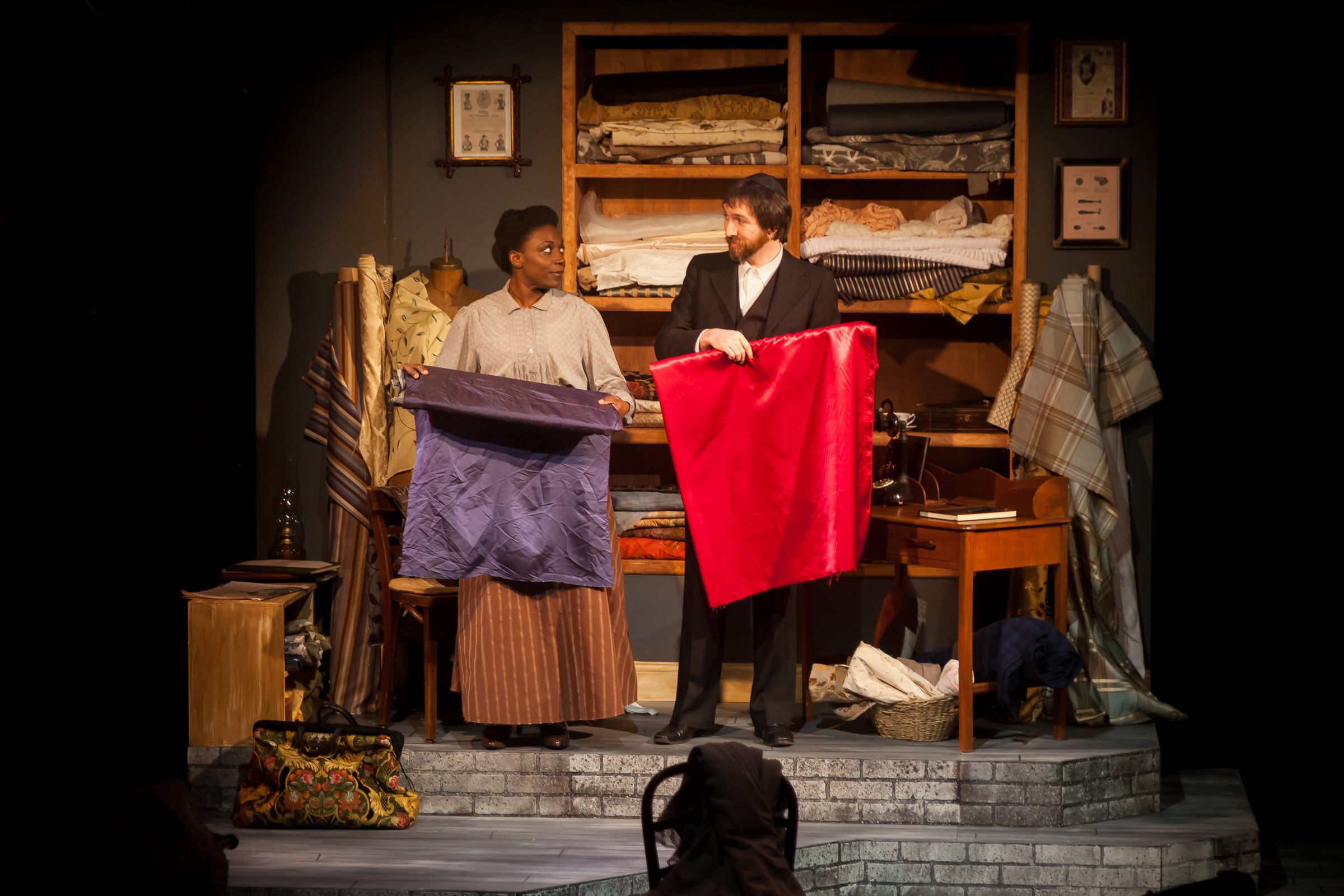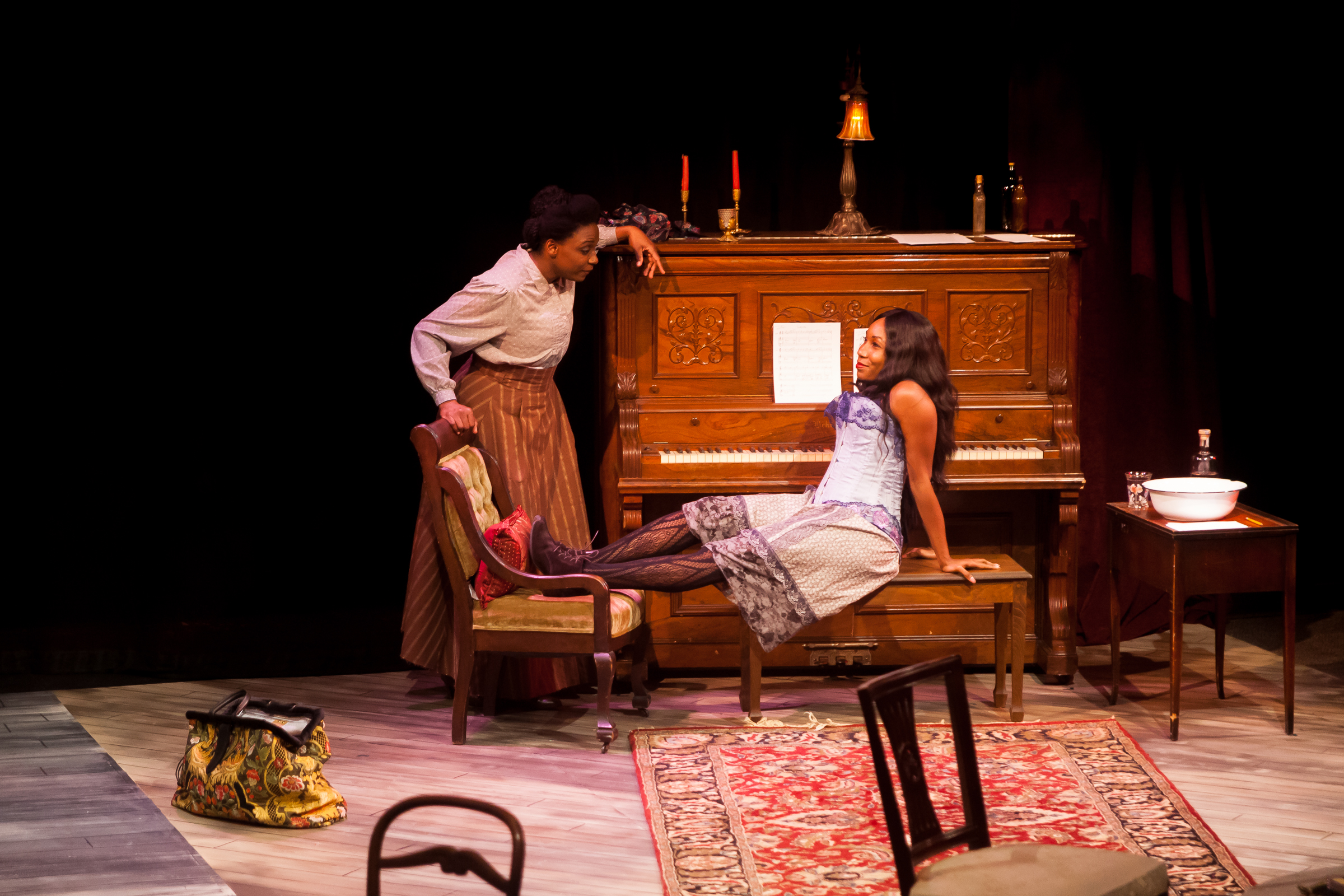Review of A Shayna Maidel, Playhouse on Park
Every family has its injustices, I suppose. But when historical tragedy becomes a factor, the injustice can be huge. In A Shayna Maidel by Barbara Lebow, now playing at Playhouse on Park directed by Dawn Loveland Navarro, the overt differences between two Jewish sisters has to do with their experiences during the period of the Holocaust. The upshot of it all is how family can endure, but the path to that conclusion is tangled and, in this production, a bit confusing.
After a mostly purposeless prologue showing the birth of Mordechai Weiss in 1876, during a pogrom in Poland, we leap ahead to 1946 and the rather spacious West Side apartment of Rose Weiss (Laura Sudduth). Mordechai (Mitch Greenberg), her 70 year-old father, tells her that her older sister, Lusia Pechenik, is coming to New York at last. The sisters haven’t seen each other since Rose was four, in the 1920s. That’s when Mordechai left his native Poland to seek his fortune in America. He took the baby, but left Lusia behind with Mama (Krista Lucas) because the older girl was sick. Then came the Great Depression, then the rise of Nazism in Germany and the invasion of Poland. Most of the Weiss family became casualties in the Holocaust.
Rose, the “lovely girl” of the title, has little memory of Poland and little interest in her absent sister, apparently. Her reaction to her father’s peremptory commands that she take in Lusia, give her the bedroom, sleep on the couch and learn to keep kosher is a bit of a panic attack, as if she’s going to be visited by a housekeeping critic. As played by Laura Sudduth, Rose lacks any appreciable Jewishness. She has a bit of what might be considered a New York accent and is thoroughly assimilated. Lusia, when she arrives, looks and sounds like we expect a Jewish Polish refugee would. There are some amiable moments of bonding, most notably a picnic on the rug.
Lusia Pechenik (Katharina Schmidt), Rose Weiss (Laura Sudduth), Mordechai Weiss (Mitch Greenberg) in Playhouse on Park’s production of Barbara Lebow’s A Shayna Maidel (photo by Meredith Longo)
Lusia has a little notebook in which the fate of all family members has been dutifully recorded. Mordechai has his notebook as well and makes a notation as Lusia doggedly reads out the litany of who was murdered when and in which place of internment. It’s a revealing moment: Mordechai acts as if the fates of those left behind—while he was getting by in New York, remember—is a bit of historical detail, satisfying a vague curiosity. He and Rose really only react to the specifics of Mama’s demise. Lusia, on the other hand, reads each name and fate—including the uncertainty about the fate of her husband Duvid and the date of their child’s death—as though each is a stake through the heart.
Lusia speaks halting English in New York, and, in flashbacks with Duvid (Alex Rafala) and her girlhood friend Hanna (Julia Tochin), speaks Yiddish that we hear as fluent English. The scenes in the past show us a lively, vibrant young woman; in the scenes in New York we see an anxious, depressed, but forceful mature woman. The best reason for seeing the Playhouse production is Schmidt’s performance. She gives the personality of Lusia a vividness that helps greatly to keep this slow story moving, making it a moving experience, ultimately—particularly when Lusia reads to Rose a letter written to her lost daughter by Mama. A dead mother’s letter to a child is a sure way to break out the hankies.
Lusia Pechenik (Katharina Schmidt), seated, Rose Weiss (Laura Sudduth), standing in A Shayna Maidel at Playhouse on Park (photo by Meredith Longo)
Another strength of the show is Greenberg’s dapper and somewhat feckless Mordechai. He appears to be a survivor who bears little guilt. A late reveal tells us much about his nature; certainly, he couldn’t have predicted the Depression that would make it impossible to pay the fare for his wife and other daughter, and certainly he couldn’t know what was going to become of the Jews in Poland, but, when confronted by Lusia about his refusals to accept monetary help, his manner is to act the aggrieved one. Greenberg delivers perfectly the self-absorbed patriarch, more concerned with his status in the new country than his obligations to the old.
Much of the play—at which Rose is mostly a bystander—seems structured to render Lusia’s life and to enact an ultimate reconciliation with Mordechai. Some sequences, such as a dream of the entire family present for the marriage/reunion of Lusia and Duvid, seem simply a contrived effort to lighten the mood. As Duvid, Alex Rafala, in his third show at Playhouse on Park, renders well the chastened hopes Duvid brings to a late scene.
There’s a discursiveness to Lebow’s scenes that feels a bit like a television script. Navarro’s production, with its blackouts for scene changes and faithful rendering of the play, could have done the material a favor by trimming scenes and finding quicker transitions. The story’s power—as a dramatic rendering of refugee hardships, and of America as a necessary destination for immigrants, and as an important chapter in the trials of a Jewish family—should allow audiences to overlook the production’s defects in favor of its deeply human resonance.
A Shayna Maidel
By Barbara Lebow
Directed by Dawn Loveland Navarro
Scenic Designer: David Lewis; Lighting Designer: Marcus Abbott; Sound Designer: Kirk Ruby; Costume Designer: Lisa Steier; Stage Manager: Mollie Cook; Props Artisan/Set Dresser: Eileen OConnor
Cast: Mitch Greenberg, Krista Lucas, Alex Rafala, Katharina Schmidt, Laura Sudduth, Julia Tolchin
Playhouse on Park
October 30-November 17, 2019





